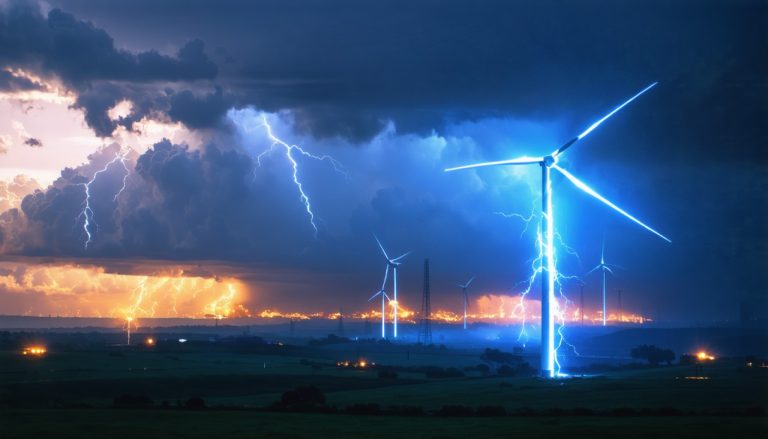
Nikola Corp. is facing a significant financial crisis, exploring urgent strategies to raise capital. According to sources, the company may consider selling part or all of its operations as it grapples with a cash shortage.
In addition to a potential sale, Nikola is evaluating options such as attracting new investors and forming partnerships. Insiders noted that no final decisions have been made, and the management team may choose a different route altogether.
Recently, Nikola issued a statement emphasizing their ongoing efforts to secure funds and enhance customer service, despite challenging conditions in the electric vehicle market. A sale would underscore a tumultuous journey for the company, especially following the departure of founder Trevor Milton due to fraud allegations just after its 2020 public debut. To add to its woes, Nikola has experienced numerous leadership changes and slumping sales.
As of January 23, Nikola’s stock plummeted by 22%, marking a staggering 95% decline over the past year. CEO Steve Girsky, who played a role in taking the firm public, is at the forefront of working to stabilize finances.
While the company had enough cash to cover expenses into early 2024, it recently indicated the need for additional funding. In response to past financial setbacks, including a significant product recall affecting its electric trucks, Nikola is actively seeking opportunities that can rescue it from this precarious situation.
Broader Ramifications of Nikola Corp.’s Financial Struggles
The precarious situation at Nikola Corp. extends beyond its internal financial struggles, rippling across the electric vehicle (EV) sector and potentially reshaping market dynamics. As one of the early entrants into the EV landscape, Nikola’s misfortunes highlight the growing volatility of a market long perceived as a lucrative frontier. A forced sale or failure of the company could undermine investor confidence in startups focused on green technology, discouraging necessary capital influx into an industry already facing fierce competition and razor-thin margins.
Amidst these struggles, the potential environmental implications are significant. Nikola’s pivotal role in advocating hydrogen fuel-cell technology reflects an emerging segment of the EV infrastructure. The resulting shifts in operations—whether it be asset liquidation or strategic partnerships—could impact the pace of adopting cleaner transportation solutions, hindering collective climate goals.
Looking forward, a wave of consolidation within the EV market may arise as larger firms seek to absorb struggling brands like Nikola. This shift could ignite innovation as conglomerates integrate new technologies but may also lead to homogenization of options for consumers, stifling diversity in eco-friendly solutions. In a long-term context, Nikola’s saga serves as a cautionary tale illustrating the need for sustainability not just in products, but in corporate governance and financial resilience—a reminder that the green revolution demands careful stewardship as much as it does innovation.
Nikola Corp: Navigating Financial Turbulence and Future Strategies
Challenges and Current Financial Situation
Nikola Corp. is currently managing a profound financial crisis, prompting the exploration of multiple avenues for capital generation. The company faces a severe cash shortage that has led it to consider selling part or all of its operations. Following a tumultuous journey that began with its 2020 public debut, Nikola is under pressure to identify viable solutions to stabilize its financial standing.
As highlighted in recent statements from the company, Nikola is not only contemplating the sale of its assets but is also looking to garner new investors and form strategic partnerships. Despite the uncertainty of these plans, executives are actively engaged in dialogues that could shape the company’s future.
Impact of Leadership Changes
The departure of Nikola’s founder, Trevor Milton, in the wake of fraud allegations significantly impacted the company. Leadership instability has hampered strategic direction and contributed to operational challenges. The frequent changes in management have raised concerns about the company’s long-term vision and its ability to execute core business plans.
Stock Performance and Market Response
Nikola’s stock performance has been dismal, with a dramatic 22% decline recorded on January 23, 2023, reflecting a staggering 95% decrease over the past year. This steep drop is indicative of the market’s lack of confidence in the company and its strategic direction under CEO Steve Girsky, who is tasked with finding a path forward amid these challenges.
Funding Needs and Operational Challenges
Nikola has acknowledged the need for additional funding despite having previously indicated enough cash to manage operations through early 2024. The urgency for capital has intensified, particularly following setbacks like a substantial product recall that affected the company’s electric trucks. The impact of these operational challenges has led Nikola to prioritize securing emergency funding and exploring potential mergers or acquisitions.
Potential Strategies for Recovery
1. Asset Sales: Exploring the sale of non-core businesses or operations could provide immediate cash flow.
2. New Investments: Attracting public or private investment could help rejuvenate its balance sheet.
3. Strategic Partnerships: Collaborations with established automotive firms or technology companies may enhance product development and market reach.
4. Innovative Product Development: Focusing on the development of innovative hydrogen fuel trucks might give Nikola a competitive edge in a crowded market.
Conclusion: Future Outlook and Predictions
Nikola is at a critical juncture where proactive measures are imperative for its survival. The company’s ability to navigate this crisis will significantly depend on its responsiveness to market trends, ability to stabilize operations, and the effectiveness of its leadership. Future success may hinge on embracing innovation and adapting to the rapidly evolving electric vehicle landscape.
For more insights on corporate strategies and market performance, visit Nikola Corp.
FAQs
What factors led to Nikola’s current financial crisis?
The crisis was triggered by a series of leadership changes, declining stock prices, significant product recalls, and fraud allegations against the founder.
How is Nikola planning to raise capital?
Nikola is exploring several strategies, including selling parts of the business, attracting new investors, and forming partnerships.
What impact have leadership changes had on Nikola?
Frequent leadership changes have led to operational instability and a lack of clear strategic direction, negatively affecting investor confidence.
What innovative strategies could Nikola implement for recovery?
Focusing on innovative technologies, especially in hydrogen fuel, and forming strategic alliances with established companies in the automotive sector could provide new growth avenues.
What has been the stock performance of Nikola in recent months?
Nikola’s stock has experienced a severe decline of 95% over the last year, with a notable 22% drop in January 2023 alone.



